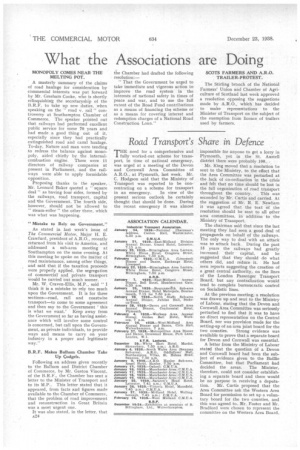Road Transport's Share in Defence
Page 26

If you've noticed an error in this article please click here to report it so we can fix it.
THE need for a comprehensive and
fully worked-out scheme for transport, in time of national emergency, was urged at a meeting of the Devon and Cornwall Area Committee of A.R.O., at Plymouth, last week. Mr. C. Hodgson said that the Ministry of Transport was reported to be concentrating on a scheme for transport
in an emergency. In view of the present serious outlook he certainly thought that should be done, During the recent emergency it was almost impossible for anyone to get a lorry in Plymouth, yet in the St. Austell district there were probably 100.
Mr. King moved that a resolution be sent to the Ministry, to the effect that the Area Committee was perturbed at the lack of co-ordination in the crisis and felt that no time should be lost in the full organization of road transport
throughout the country. This was seconded by Mr. Curtis and carried. At the suggestion of Mr. R. E. Newham it was agreed that the text of the• resolution should be sent to all other area committees, in addition to the Ministry of Transport.
The chairman said that since the last meeting they had seen a good deal of propaganda on behalf of the railways. The only way to deal with an attack was to attack back. During the past 15 years the railways had greatly increased their capital, and he suggested that they should do what others did, and reduce it. He had seen reports suggesting the creation of a great central authority, on the lines of the London Passenger Transport Board, but any centralization would tend to complete bureaucratic control on Socialistic lines.
. At the previous meeting, a resolution was drawn up and sent to the Ministry of Labour, stating that the Devon and Cornwall Area Committee was seriously perturbed to find that it was to have no direct representation on the Central Board, nor was provision made for the setting-up of an area joint board for the two counties. Strong evidence was available to prove that a separate board for Devon and Cornwall was essential.
A letter from the Ministry of Labour stated that the question of a Devon and Cornwall board had been the subject of evidence given to the Baillie Committee, but that Parliament had decided the areas. The Minister, therefore, could not consider establishing a separate board and there would be no purpose in receiving a deputa tion. Mr. Curtis proposed that the Area Committee ask the Western Area Board for permission to set up a voluntary board for the two counties, and this was agreed to. Iffr. Foster and Mr. Bradford were chosen to represent the committee on the Western Area Board.




































































